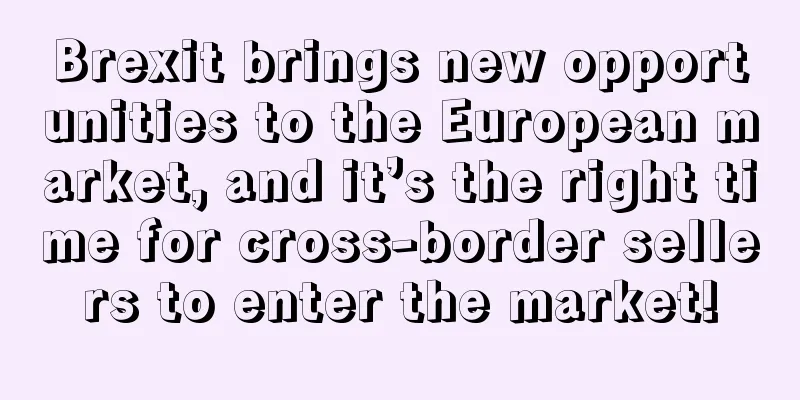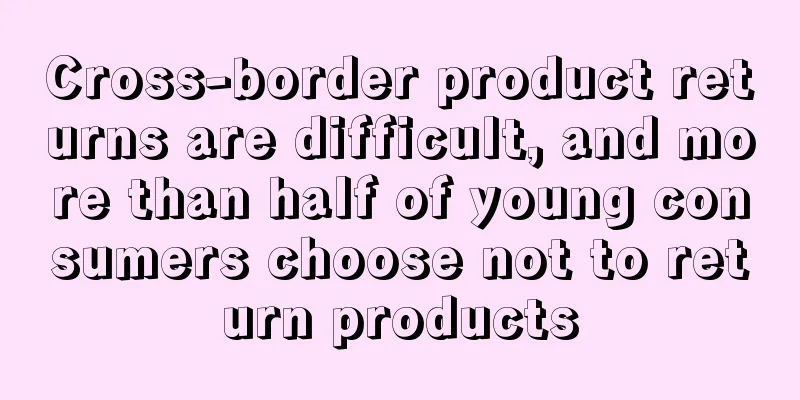Brexit brings new opportunities to the European market, and it’s the right time for cross-border sellers to enter the market!

|
It has been a month since the UK officially left the EU, but the "aftermath" of Brexit is still plaguing British merchants and businesses at all times. However, for cross-border sellers, this is a huge opportunity.
UK-EU trade has suffered a major blow, with a huge gap in the European market
After Brexit, the once free trade between the UK and the EU has suddenly become more complicated with more formalities and paperwork, and various delays have also come one after another. British exporters said that meat and seafood could not enter the European market in time because they had to wait for European health inspections and complicated new paperwork, and could only rot on trucks. In addition, 60% of manufacturing companies suffered "significant damage."
Although the UK-EU trade agreement after Brexit allows goods to circulate without tariffs or quotas, companies will also face new costs, paperwork and other obstacles. Although many companies have done their best to prepare, the details of the new agreement were not finalized until December 24, just over a week before the agreement came into effect, which still caught many companies off guard.
The British government said that all the problems it is currently facing are just "painful problems" in the early stages , and the situation is not that serious: there is no food shortage in the UK, but the government and companies have made reserves based on the epidemic; there is no congestion in the English Channel ports, and the expected worst-case scenario (7,000 trucks lined up in a long queue) has not occurred...
However, business groups said this was because some companies were not involved in the transport of goods at all, with the current flow of goods being only about three-quarters of the level in January 2020, and many companies had "suspended imports and exports from the EU in the hope that the situation would improve."
A recent survey by e-commerce technology company Pitney Bowes showed that a quarter of French and German consumers said they had reduced the number of times they ordered British goods online due to increased costs caused by tariffs and customs requirements. 61% of French consumers and 68% of German consumers plan to reduce online consumption or stop buying products from the UK altogether, which also means that there are currently large gaps in the British and European markets waiting for cross-border sellers to fill.
The China-EU trade situation is good, and Chinese manufacturing has become the main choice for European countries
According to data released by the European Statistical Office last year, the total trade in goods between China and the EU exceeded 425.5 billion euros, making China the EU's largest trading partner. In the second quarter of last year, Chinese companies exported goods worth 11 billion pounds to the UK, making China the UK's largest import partner.
In addition to the rapid development of cross-border e-commerce during this year's epidemic, Chinese sellers have also paid more and more attention to product quality and brand building, and have gained a firm foothold in the European market with the advantages of high quality, low price and strong durability. Now, not only China's traditional manufacturing products, but also some high-tech industries are home to Chinese companies. From masks, ventilators, wigs, household products to small appliances, sweepers, and drones, the European market has been "surrounded" by Chinese products in all aspects .
Even because China is about to celebrate the Spring Festival, European importers are worried that the holiday will cause large-scale shutdowns of Chinese factories, so they have stockpiled a large number of Chinese goods. Some experts believe that Chinese-made anti-epidemic products will still be the main choice for European countries in 2021. policy Cross-border e-commerce market Brexit |
<<: New trend! Demand for "elderly toys" soars, and the blue ocean market will explode
Recommend
Another step forward! Japan's cabinet approves RCEP trade agreement bill
Since the Regional Comprehensive Economic Partner...
Orders dropped by 30%, this peak season is a bit cold
October is almost over. As the beginning of the p...
What is E-Gate? E-Gate Review, Features
E-Gate Germany GmbH was founded in 2007 and is loc...
What is Blue Apron? Blue Apron Review, Features
Founded in 2012, Blue Apron is a provider of home...
The top 10 most popular retailers for the back-to-school season in the United States are announced, and Amazon's ranking is surprising!
Recently, JLL (Jones Lang LaSalle) released its l...
Amazon sellers were maliciously complained of infringement, and the official removed their products from the shelves and have not restored them yet
The editor learned from Amazon's official sel...
Search volume increased by 2450%, and when will the US housing market collapse?
Due to the COVID-19 pandemic, the U.S. housing ma...
Attention! Japan is expected to lift the state of emergency on March 21
According to foreign media reports , the Japanese...
What is nom nom now? nom nom now Review, Features
Nom Nom Now is a store that focuses on providing f...
TikTok officially launches new advertising function, and the traffic boom is coming again!
On August 26, TikTok announced on its official we...
What is Zenda? Zenda Review, Features
<span data-docs-delta="[[20,{"gallery"...
What is Poshmark? Poshmark Review, Features
Poshmark is a fashion e-commerce platform located...
What is fulfilmentcrowd? fulfilmentcrowd Review, Features
FulfilmentCrowd enables faster, cheaper shipping ...
What is Shopping Actions? Shopping Actions Review, Features
Shopping Actions is a new plan announced by Googl...
Shopee updates three major policies, Indonesian traditional clothing will be banned from sale!
In the announcement released by Shopee, there is ...









